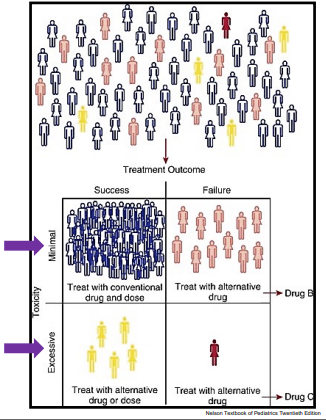Pharmacogenetics and Pharmacogenomics (Precision Medicine)
1/9
There's no tags or description
Looks like no tags are added yet.
Name | Mastery | Learn | Test | Matching | Spaced |
|---|
No study sessions yet.
10 Terms
Pharmacogenetics
is the field of study dealing with the variability of responses to medications due to variation in single genes and considers a person’s genetic information
heritable variability in drug response or gene–drug interactions
The goal of pharmacogenetics is to create an individualized drug therapy that allows for the best choice and dose of drugs.
Pharmacogenomics
similar to pharmacogenetics, except that it typically involves the search for variations in multiple genes that are associated with variability in drug response
examine the entirety of the genome
Pharmacogenomic studies may also examine genetic variation among large groups of people (populations)
individualized drug therapy
Pharmacogenetics and pharmacogenomics have become synonymous with “individualized drug therapy”
subset within the broader field of “personalized medicine” or “precision medicine”.
Personalized Medicine
Based on each person’s unique clinical, genetic, genomic, and environmental information which will allow healthcare providers to optimize preventive healthcare strategies and drug therapies while people are still well or at the earliest stages of disease
The stratification of patient populations according to their response to a particular medication (e.g., lack of drug efficacy or excessive toxicity).
The stratification of diseases into specific subtypes that are categorized according to genomic criteria and by response to particular treatments.
Revised Dosing Strategy Approach
The goal of personalized medicine will be achieved by identifying subgroups of patients who will respond favorably to a given drug with a minimum of side effects, as well as those who will not respond or who will show excessive toxicity with standard doses.
select the most appropriate alternative drug for patients who cannot be treated successfully with conventional drugs and doses.

Precision medicine
an emerging approach for disease treatment, diagnosis, and prevention which considers individual variability in genes, environment, and lifestyle for each person.
FDA Table of Pharmacogenomic Biomarkers in Drug Labeling
lists therapeutic products with pharmacogenomic information found in the drug labeling
includes specific actions to be taken based on the biomarker information (polymorphisms)
Pharmacogenomic Biomarkers: Prescribing Info for Clopidogrel
CYP2C19 Inhibitors
-Clopidogrel is metabolized to its active metabolite in part by CYP2C19. Concomitant use of drugs that inhibit the activity of this enzyme results in reduced plasma concentrations of the active metabolite
Omeprazole or Esomeprazole
-Avoid concomitant use of Plavix with omeprazole or esomeprazole.
Omeprazole (Prilosec®) and Esomeprazole (Nexium®)
Medication Class: Proton Pump Inhibitors
Indications: Gastroesopheal reflux disease (GERD), peptic ulcer disease (gastric/duodenal ulcers) and heartburn (OTC use).
Mechanism of Action: Suppress gastric acid secretion by inhibiting the proton pump
Public Health Genomics Knowledge Base (PHGKB)
Contains a Tier Table Database (Tiers 1-3) of currently available genetic and genomic tests and family health history, classified into Tiers 1-3 by level of evidence.
Tier 1: Genomic and family health history applications have a base of synthesized evidence supporting implementation into practice